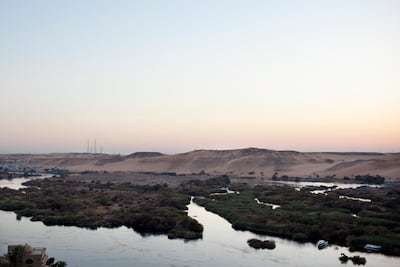Egypt’s southern regions were hit by a wave of severe weather at the weekend, leading to flash floods and torrential rainfall.
The Upper Egyptian province of Aswan suffered the most as intense hailstorms and flash floods caused a large number of scorpions and snakes to be washed into the city’s centre from their desert and mountain habitats that surround the city.

Panic spread on social media on Saturday when Aswan residents began posting live updates of the storms, amid reports that several people had died and hundreds were injured because of scorpion and snake bites after the storm.
Although four deaths were attributed to scorpion bites by a number of local newspapers, health ministry spokesman Khaled Megahed denied this during a televised interview on a popular Egyptian talk show on Saturday.
He attributed the deaths to drowning and road accidents brought on by the unseasonable storm.
“Our condolences go out to the families of those who died in the storms, but we can conclusively say that all the deaths were caused by the weather and not by scorpion bites,” said Mr Megahed.
He confirmed that more than 450 people had been stung by scorpions in Aswan, but insisted all of them received expedient medical treatment and survived the stings.
Mr Megahed stressed the ministry’s readiness to deal with the ongoing storm and confirmed that hospitals nationwide were fully equipped with enough doses of snake and scorpion anti-venom.
He urged anyone who gets stung by a scorpion to head to the nearest hospital to receive treatment right away. Common symptoms, he said, included severe pain and a high fever.
Videos shared on social media showed trees being uprooted in Aswan while others showed lamp posts which had collapsed because of the wave of bad weather.
The Egyptian Meteorological Authority early last week predicted that southern provinces would be hit by a heavy rainfall and urged residents of Upper Egypt and Sinai to take necessary precautions.
A televised statement from the EMA on Sunday revealed that wind speeds had reached 60 kilometres per hour on Saturday.

While rainfall is expected to continue over the next few days in the south of Egypt, the worst of the storm has passed, and as the week moves on, the weather is expected to stabilise, it said.
The intensity of the storm shone a spotlight on the unseasonable bad weather, which many commentators are attributing to the effects of climate change.
“Aswan has not witnessed such a bad wave of weather in a few years. I think we can conclusively say that this wave of bad weather was caused by climate change,” an EMA representative said.
Mr Megahed said the country’s Higher Education Minister Khaled Abdel Ghaffar, who is currently filling in for Health Minister Hala Zayed after she was forced to step down because of medical problems, is following up on the situation every six hours, and hundreds of ambulances are currently on stand by to assist anyone injured in the ongoing storms.
Hospitals in the affected provinces have been instructed to prepare to receive all those injured in the storms, which also caused vital roads to be closed at the weekend.

